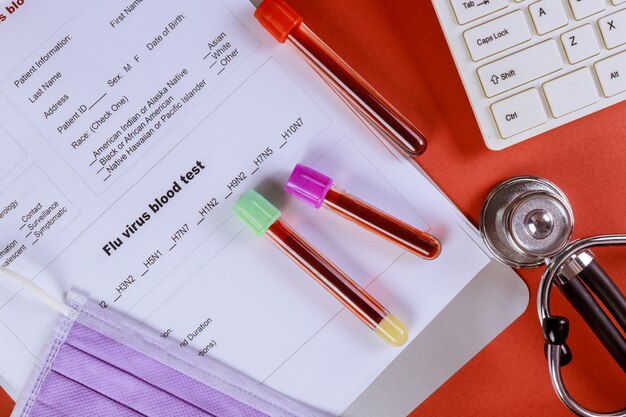Understanding the Normal Range for Hepatitis B Surface Antibody: What You Need to Know
When you hear about hepatitis B, you might think of a complex and concerning health condition. However, understanding specific components such as the hepatitis B surface antibody, often abbreviated as anti-HBs, can demystify some of that complexity and give you insight into your health status. If you're wondering what the normal range for this antibody is and why it matters, you're in the right place. This article will explore the hepatitis B surface antibody's role, its normal range, and what it signifies about immunity and health. 🧬
What Is Hepatitis B and Why Is It Important?
Hepatitis B is a liver infection caused by the hepatitis B virus (HBV). It can lead to both acute and chronic disease, making it a significant health concern worldwide. The virus spreads through contact with infectious body fluids, making vaccination crucial in prevention.
- Impact on Health: Chronic hepatitis B can lead to serious conditions such as cirrhosis or liver cancer.
- Prevention: Vaccination is the most effective way to prevent HBV infection and its complications.
Understanding the body’s response to this virus, particularly through the presence of antibodies, plays a critical role in managing and preventing the spread of HBV.
What Are Hepatitis B Surface Antibodies?
The hepatitis B surface antibody (anti-HBs) is an immune response protein produced by the body when it encounters the hepatitis B virus. When you are vaccinated against hepatitis B, your body produces these antibodies without causing disease, offering protection against future hepatitis B infections.
Role of Anti-HBs
- Defense: Anti-HBs act as a defense mechanism, indicating that the body is fighting off or has fought off the HBV.
- Immunity Indicator: These antibodies are a marker of immunity from vaccination or past infection.
The Normal Range for Hepatitis B Surface Antibody
Now, the critical piece of information you may be looking for: what is considered a normal range for the hepatitis B surface antibody, and what do these numbers signify?
Understanding the Levels
- Negative (non-reactive): Less than 10 mIU/mL (Milli-International Units per Milliliter)
- Positive (reactive): 10 mIU/mL or more
A result of 10 mIU/mL or more suggests that you are immune to hepatitis B, either due to successful vaccination or past infection clearance. If your level is below this, it might mean you are not immune and may consider vaccination or booster doses.
Interpreting Antibody Test Results
Understanding your specific antibody levels can provide insights into your immunity status:
- 0–9 mIU/mL: Likely non-immune. May require vaccination or a booster.
- 10–100 mIU/mL: Adequate immunity. Considered protected.
- Over 100 mIU/mL: Strong immunity.
These levels can guide healthcare providers in making recommendations regarding vaccination and further testing, without providing direct medical advice.
Importance of Getting Tested
Regular health screenings, including testing for hepatitis B antibodies, enable individuals to take proactive steps toward maintaining their health:
- Confirmation of Immunity: Testing determines if vaccination or previous infection resulted in immunity.
- Disease Monitoring: Helps in monitoring for chronic hepatitis B if previously infected.
Factors That Influence Antibody Levels
Several factors can influence hepatitis B surface antibody levels:
- Vaccination: Timing and number of doses can affect levels.
- Age: Younger people might produce a stronger immune response.
- Health conditions: Immune status can be influenced by certain health conditions or treatments.
- Vaccine response: Natural differences in individual immune system responses.
After Testing: Understanding Your Next Steps
Based on your test results, considering your next steps can maintain vigilance over your health. If you're immune, ensure your healthcare records reflect that status. If not, consulting with a healthcare provider about potential vaccination options could be wise.
Vaccination and Boosters
For those not yet immune, vaccination is a safe and effective measure to prevent hepatitis B infection:
- Three-Dose Vaccination: Typically includes a sequence given over six months to stimulate immunity.
- Booster Shots: May be recommended for certain individuals if antibody levels fall below 10 mIU/mL over time.
Global Perspectives on Hepatitis B Immunity
Around the world, public health initiatives emphasize the importance of hepatitis B immunization to control and prevent outbreaks:
- Vaccination Programs: Many countries include hepatitis B vaccination in routine immunizations for infants.
- Awareness Campaigns: Highlight the importance of vaccination and follow-up testing for maintaining immunity levels.
Practical Tips for Managing Your Hepatitis B Immunity
Ensuring you and your family are protected against hepatitis B involves a few clear steps:
- Get Vaccinated: If you haven’t been vaccinated, talk to your healthcare provider about starting the series.
- Stay Informed: Keep up-to-date with guidelines on hepatitis B vaccination and testing.
- Regular Testing: If you’re at risk or traveling to high-prevalence regions, consider regular anti-HBs testing.
- Consult Healthcare Professionals: Always seek professional advice to understand your personal health situation better.
Summing Up: Key Takeaways
Understanding your hepatitis B surface antibody status is essential for protecting your health and those around you. The presence and level of anti-HBs serve as an indicator of immunity, vital in making informed health decisions.
Here's a quick visual summary to keep in mind:
🌿 Immunity Levels:
- 0–9 mIU/mL: Non-immune
- 10+ mIU/mL: Immune
- 100+ mIU/mL: Strongly immune
💉 Vaccination:
- Important for prevention
- Consider follow-up testing after vaccination
🌍 Global Health:
- Hepatitis B control through vaccination
- Public health initiatives are crucial
Understanding these facets ensures you are well-prepared to manage and maintain your hepatitis B immunity in today's global health landscape. Whether it's through vaccination, regular testing, or staying informed, proactive measures can empower you to take charge of your health with confidence.

